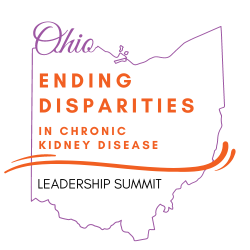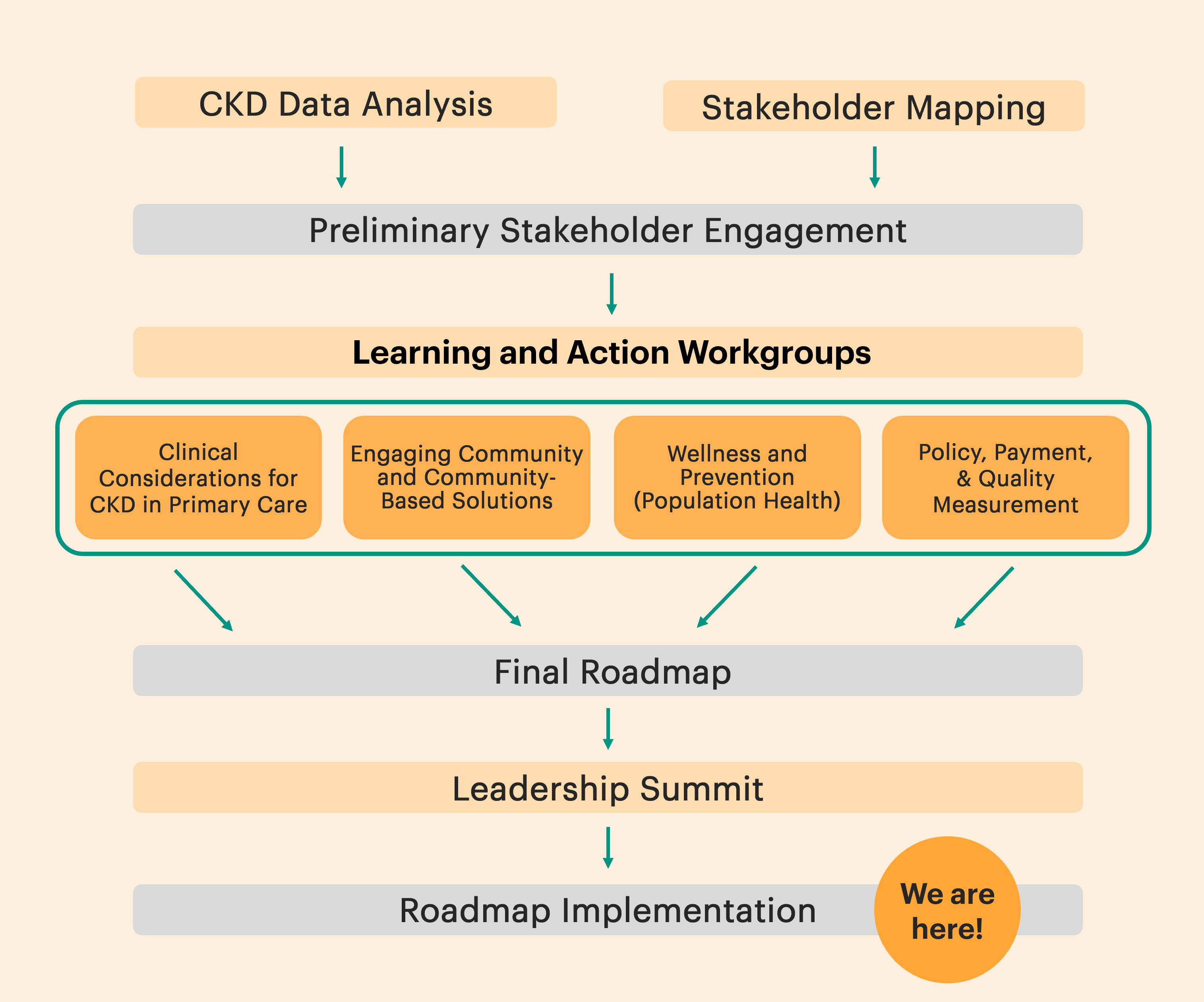
About the Initiative
In Ohio, 1.3 million adults have CKD, while only 150,000 are aware of it. Testing for CKD remains low, as less than 15% of people at risk for CKD with diabetes and hypertension are tested annually in Ohio.
As part of a national NKF Collective Impact strategy, Ohio stakeholders are implementing a roadmap to drive a cultural shift in primary care- toward increasing the early diagnosis and management of CKD, especially in communities disproportionately burdened by CKD.

Learning and Action Workgroups
Through a series of facilitated discussions, health care and public health leaders havee met to identify barriers and solutions to improve CKD awareness, detection, and management in Ohio and especially tools and strategies that can be implemented within stakeholders’ own institutions. The learning and action workgroups support increased awareness and action amongst the participants. Four workgroups convened covering the following topics:
Clinical Considerations for CKD in Primary Care
- Goal: To discuss strategies and approaches that can be employed to improve CKD recognition and care in primary care settings.
Background: A large, national study illustrated that less than 12% of people with CKD were diagnosed in primary care.2 This included as many as 40% of people whose kidneys required specialty care. With the advent of new therapies demonstrated to slow or stop the progression of CKD, there is a very real opportunity to improve quality of care for people with CKD across the entire spectrum of disease.
Engaging Community and Community- Based Solutions
- Goal: To develop strategies to advance CKD awareness through community engagement and to ensure that health care providers are aware of the community resources available to delay CKD progression.
Background: In the US today, only 10% of people with laboratory evidence of CKD know that they have kidney disease.3 Improved patient awareness, engagement, and Self-Management are vital to successfully slowing CKD progression. As diabetes and hypertension play significant roles in the development of CKD, working with community organizations that support people with chronic disease can be an important step toward raising public awareness of CKD among those at risk for CKD.
Wellness and Prevention (CKD Population Health)
- Goal: To develop a strategy to incorporate CKD testing and diagnosis into wellness and prevention practices within the employer/commercial health plans, and the broader community.
- Background: To date, almost 90% of people living with CKD remain undiagnosed in the population and the majority will not receive guideline recommended annual testing.5 This breakout session will discuss the strategies that can be developed and employed to ensure that CKD testing and diagnosis are included as part of the wellness and prevention services, including corporate programs, diabetes prevention activities, etc., that are available in the state.
Policy, Payment, and Quality Measurement
- Goal: To develop a strategy to streamline CKD testing in primary care from a policy and payment perspective.
- Background: In July 2020, the NCQA released the Kidney Health Evaluation for Adults with Diabetes HEDIS measure (KHE).4 This measure assesses the percentage of people with diabetes that receive both tests for CKD during the course of a year. When tested against over 70 claims datasets, this measure was achieved in only 35% of cases. This measure began collecting data for public reporting in October 2021.
Roadmap
After 16 hours of facilitated discussions, 90 stakeholders identified 16 strategies to improve testing, diagnosis, and early management of CKD in Ohio. Read the roadmap summary here.
Meet Our Summit Co Chairs:

Lisa D. Kelly, MD, MEd, is Professor of Ophthalmology and holds the Taylor Asbury Endowed Chair at the University of Cincinnati College of Medicine. She is medical director of the University Cincinnati Medical Center Ophthalmology Clinics as well as the Director of Medical Student Education.
Dr. Kelly received her bachelor and medical degrees from Harvard University, she completed residency at Stanford Medical School, followed by fellowship at the Massachusetts Eye and Ear Infirmary of Harvard Medical School. She received her Master's Degree in Education from John's Hopkins.
Dr. Kelly's research interests include the impact of social determinants of health, health disparities in minoritized groups and population health. She has been awarded 16 prizes for excellence in teaching and mentoring.
Dr. Kelly is president-elect of the National Directors of Medical Student Educators' Council. She is also Chair of the American Academy of Ophthalmology Executive committee for the award-winning Minority Mentoring Program. In 2022 she was elected to the American Academy of Ophthalmology Board of Trustees.

Crystal Gadegbeku, MD, is Chair of the Department of Kidney Medicine in the Glickman Urological and Kidney Institute of the Cleveland Clinic Health System. She has been involved in NIH-funded clinical and translational research ranging from epidemiologic studies to clinical trials in kidney disease and hypertension including serving in leadership roles for multi-centered research collaborations. She also has an interest in exploring research engagement of diverse populations, especially among racial and ethnic groups overburdened with kidney disease. Her areas of clinical interest include management of hypertension and cardiovascular disease in patients with chronic kidney disease. Dr. Gadegbeku has served two terms as Chair of the American Society of Nephrology (ASN) Policy and Advocacy Committee and currently serves as an ASN Councilor and member of the National Kidney Foundation-American Society of Nephrology Task Force on Reassessing the Inclusion of Race in Diagnosis Kidney Diseases.
Dr. Gadegbeku also serves on the National Kidney Foundation Northern Ohio Board of Advisors.
Leadership Summit
On October 12, 2023, NKF of Ohio hosted a virtual summit to present the recommendations and engage partners in joining the Collective Impact approach. Over 225 individuals registered and 125 attended the live summit with 227 commitments from 46 individuals to support implementation of the 16 recommendations.
Learn More and Join the Collective Impact Effort
Anna Tzinis, Executive Director, Ohio- anna.tzinis@kidney.org
Anna Fetzer, Population Health Partnership Director- anna.fetzer@kidney.org
References
- Hanley Brown, F. Kania, J. and Kramer, M. Channeling Change: Making Collective Impact Work. Stanford Social Innovation Review. 2012. https://doi.org/10.48558/2T4M-ZR69
- Szczech, Lynda A., et al. “Primary Care Detection of Chronic Kidney Disease in Adults with Type-2 Diabetes: The ADD-CKD Study (Awareness, Detection and Drug Therapy in Type 2 Diabetes and Chronic Kidney Disease).” Public Library of Science, 26 Nov. 2014. https://doi.org/10.1371/journal.pone.0110535
- “Chronic Kidney Disease (CKD) Surveillance System: Awareness.” Centers for Disease Control and Prevention. https://nccd.cdc.gov/ckd/detail.aspx?QNum=Q97#refreshPosition
- Brock, Matt. “Kidney Health: A New HEDIS Measure.” NCQA Blog, 16 Jul. 2020. https://blog.ncqa.org/kidneyhealth/
- “Chronic Kidney Disease in the United States, 2021.” Centers for Disease Control and Prevention, 4 Mar. 2021. https://www.cdc.gov/kidneydisease/pdf/Chronic-Kidney-Disease-in-the-US-2021-h.pdf